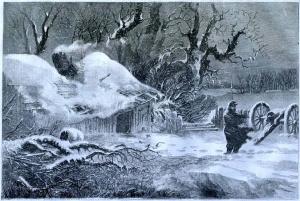Another Brutal Winter….150 Years Ago
While many of us endure one of the most brutal winters in recent history, made a bit easier by modern conveniences, I thought this might be a good opportunity to add some historical perspective by taking a look at the equally brutal winter weather conditions of January 1864 and its effect on the Federal troops in the field. What follows is an excerpt from the “History of the 81st Ohio Volunteer Infantry Volunteers during the War of the Rebellion” by the major of the 81st, W.H. Chamberlin:
“The old year died in a storm of wind and snow and hail. Hoary winter, with his beard of icicles, and his breath of frost, triumphantly ushered in the New Year, and placed him on his icy throne. Every wind and zephyr caught the spirit of the new dynasty, and straightway, like couriers, they sped over the land, carrying with them the chill that encircled the throne. High carnival for “Winter! A new year inaugurated under his auspices. Eight vigorously does he use his power. Perhaps, as around our northern homes the wintry blasts howl, and the snow flies in eddying whirls, and the air becomes like a knife, while within-doors the grates glow with warmth giving coals, and the cabin hearths are ablaze with the roaring, crackling winter fires—perhaps in our homes there are hearts that shudder as they think of some loved one in their circle, now absent in the army, and wonder if he is not cold and shivering on a cheerless picket post. ‘Oh, where is my boy to-night?’ is the anxious inquiry of many a mother’s heart, as she looks out on the wintry scene.
Alas! that I can not say that the soldiers do not suffer! Winter brings no cessation of duty. As many men stand as sentinels around this command when the thermometer falls below zero as when the sun sends down his kindliest rays. The Quartermasters send as many wagons over the frozen ground for forage and supplies as they sent when the ground was smooth. The teamsters and train guards are not lessened in number. Yet, after all, there is more solicitude for our comfort in the homes we have left, than we feel here. Each soldier makes it his special duty to provide for his own comfort, and the result is that he suffers comparatively little, and complains less than if he depended upon others. If on picket, he passes his two hours of duty as best he may, knowing that at the end of his ‘trick’ he has four hours at his own disposal, in which time he can provide a fire. He does not sit down helplessly, and whine because the Government does not provide him a warm shelter—he builds one for himself, and if on returning to the same post to duty, he finds his shelter burned, he sheds no childish tears over his misfortune, but with a patience and cheerfulness that would do honor to the traditional spider, with a broken web, he builds again and again for the hundredth time.
The citizens of this vicinity say that not since 1837, has there been such cold weather as that of the past week. Yet, notwithstanding the number of men exposed, there has been no case of severe freezing among them all. Here and there an ear or a finger has been ‘frosted,’ but there have been no serious cases.”
And so the “Boys of 61” endured a long, brutal winter. Whether they soldiered in Virginia or Georgia, I wonder how many of them reflected back on the chill of the past winter, while they endured the long marches, fierce fighting and the bone numbing fatigues of trench warfare during the heat of the upcoming summer campaigns of 1864?
Sources: “History of the 81st Ohio Volunteer Infantry Volunteers during the War of the Rebellion” by W.H. Chamberlin, Late Major of the Regiment.
Available on line at :

